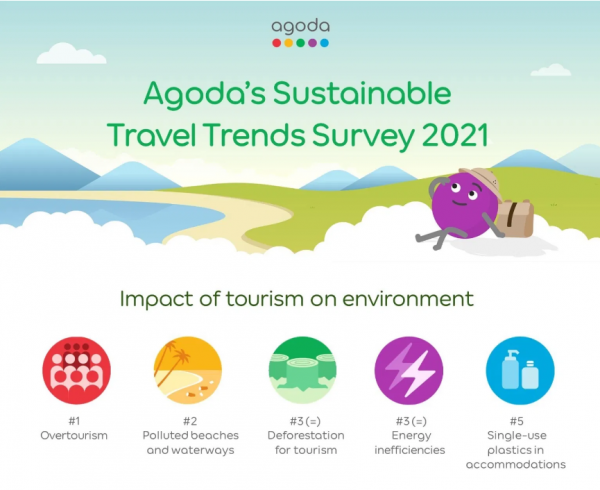SINGAPORE, 8 June 2021: Travel consumers will be looking for sustainable, eco-friendly travel options that eliminate the use of single-use plastics, while financial incentives should be in place for accommodation providers who maximize energy efficiencies.
These are the three standouts that will make travel more sustainable, according to Agoda’s Sustainable Travel Trends Survey.

Survey findings showed travel consumers want to see countries establish more protected areas to limit tourist numbers while accommodation providers must speed up the elimination of single-use bathroom amenities.
The findings from the survey launched on World Environment Day 2021 (5 June) also revealed globally that overtourism and pollution of beaches and waterways are now the top two top concerns. They are ahead of concerns for deforestation and energy inefficiencies (including overconsumption of electricity and water resources) ranked a joint third.
Globally, the public considers governments most accountable for making positive environmental changes around travel, followed by tourism authorities and individuals themselves.
When it came to holding governments most accountable, those in Indonesia and UK were most likely to do so (36%), China followed not too far behind at 33%, with Australia and Malaysia in fourth and fifth spot (28% and 27% respectively). The markets most likely to cite themselves or individuals as most responsible for making changes to travelling sustainably were Thailand (30%), Japan (29%) and the US (28%). Meanwhile, China (11%), the UK (13%), and Vietnam (14%) were least likely to attribute responsibility to the individual.
The survey showed that the top must-do responses to save the environment were:
Manage waste, including using less single-use plastics;
Switch off the aircon and lights when leaving their accommodation;
Always look for eco-friendly accommodation.
No ‘one size fits all for’ sustainability
- The top practices most associated with environmentally friendly or sustainable travel were:
- Renewable energy and resources like solar, wind, hydroelectric and water;
- No single-use plastics;
- Animal conservation;
- Create a smaller carbon footprint.
Other energy-saving solutions such as key cards or motion sensors, using natural cleaning products are the other key practices. Interestingly, buying locally sourced products, reusing bedding or towels during holiday stays and visiting off-the-beaten-track destinations were the bottom three practices out of 10 associated with sustainable travel.
“We can see from the Agoda Sustainable Travel Trends Survey that the messages of taking simple steps such as switching off lights and air conditioning when leaving the room or reducing waste by minimizing the use of single-use plastics are being embraced by the public across the globe. What is also clear is that while globally the message is Governments need to take the lead on managing sustainable travel, there is recognition that some responsibility lies with people’s own behaviour,” explains Agoda CEO John Brown.
Covid-19 negatively impacts attitudes to sustainable travel
The increase in desire to travel more sustainably was most prevalent among respondents from South Korea, India and Taiwan, 35%, 31% and 31%, respectively. However, looking at the figures globally, while 25% have an increased desire to travel more sustainably, this compares with 35% whose desire to do so decreased. The markets reporting the biggest proportional decrease were Indonesia (56%), Thailand (51%) and the Philippines (50%).
“Many people see sustainable travel as less important today than they did before Covid-19, but I hope that is just a short-term effect, driven by people’s thirst to get back out there and travel any way they can,” Brown concluded.







